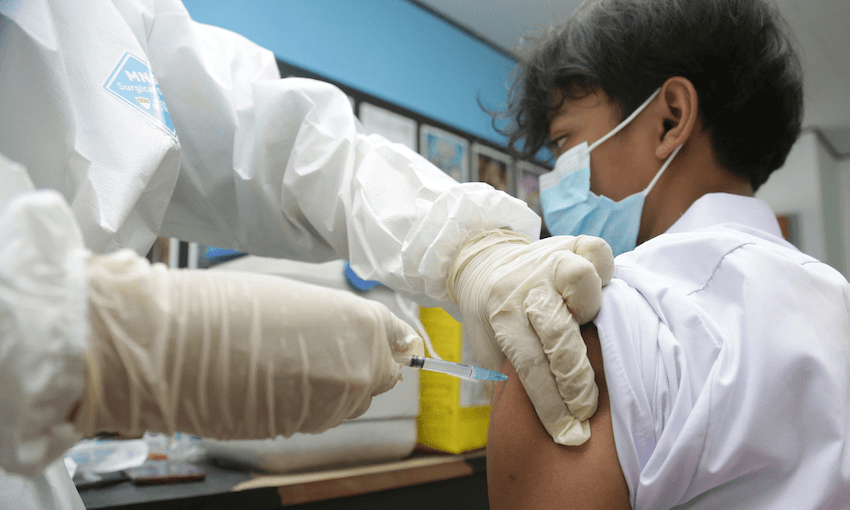This month, 7.4 million AstraZeneca doses will arrive in NZ. We should give them away, says Jo Spratt of Oxfam Aotearoa.
Three weeks ago our prime minister chaired an extraordinary Apec session focused on the coronavirus pandemic, declaring at its conclusion that “our discussions moved us beyond vaccine nationalism”. This government has regularly declared it is against vaccine nationalism. But when I look at how many doses we have purchased for New Zealanders, I’m not convinced.
While New Zealand remains precariously free from community coronavirus transmission, the pandemic continues to cost lives and livelihoods across the world. Delta shows us how dangerous this virus is when it mutates. We see this every day in our news feeds. Meanwhile, vaccine supply shortages allow this virus to circulate relatively unchecked, leading the way for even more dangerous mutations. Because pharmaceutical corporations have monopoly rights over vaccine intellectual property, and because they cannot make enough, they are able to charge high prices for vaccines. This gives wealthy countries, like New Zealand, an advantage when negotiating for vaccines. That is why New Zealand has vaccines, while people in countries like Solomon Islands, Papua New Guinea, and Fiji largely wait for charity.
The table below shows how many vaccine doses the government has purchased, or has the right to purchase, to vaccinate New Zealanders. When we put it all together, we have access to enough vaccine to fully vaccinate the New Zealand population over four times.
In May our government donated 1.6 million doses that we had purchased for our own use through the global Covax mechanism. Instead of being allocated to New Zealand, these doses were allocated to the least developed countries that Covax purchases vaccines for. We also said we would donate 250,000 AstraZeneca doses from our domestic supply. These have not yet been delivered because Medsafe had to approve them before we could donate them, and this only occurred on July 22. Besides that, we don’t actually have any AstraZeneca in the country, which is presumably why the government has announced it will purchase 100,000 AstraZeneca doses from Spain to donate to Fiji. But Cabinet is considering what should be done with the remaining 7.4 million AstraZeneca doses when they do arrive in the country, anticipated to be this month.
We should give them away. People in other countries need them now.
Indonesia, one of the world's most populated countries, and one of our close neighbours, has full vaccination rates of just 7.6% as the virus runs rampant, with over 39,000 new coronavirus cases and over 1,700 deaths on August 1 alone. In Papua New Guinea, only 0.1% of people have been fully vaccinated. There is limited testing going on and high levels of vaccine hesitancy due to misinformation; it is hard to know what is really going on, in a country with a barely functioning health system, and where the government regularly fails its people. Across the poorest countries, only 1% of people have received even one vaccine dose. Their governments cannot afford to bargain with pharmaceutical corporations to get the help their people need. For example, one dose of the vaccine in Uganda costs their government the entire amount it spends on each citizen each year to provide all health services.
We think of ourselves and our country as generous people who contribute constructively to world affairs. What better time to test this belief than in the midst of a global pandemic. And nowhere does it hurt people more than in countries that are poor and indebted, including in our own backyard. It would be wonderful to live in a world where people in poorer countries did not have to wait for the decisions of people in wealthy countries like New Zealand to get a vaccine. But until we do, the very least the New Zealand government can do is share vaccines we do not need. Only then can we start to claim we have moved beyond vaccine nationalism.
